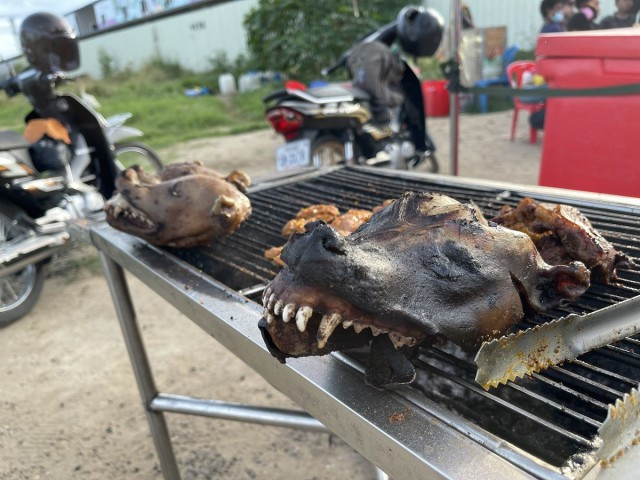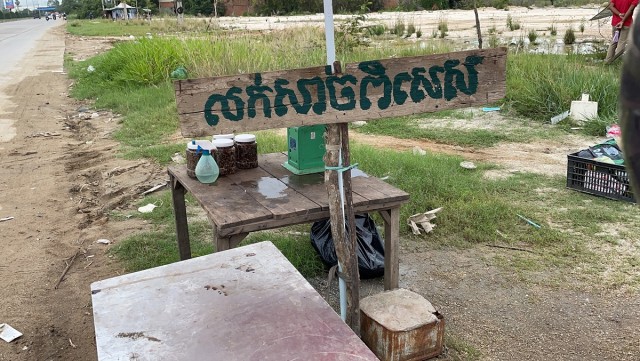Dog-meat Business Survives Despite Opposition

- By Hong Sreyna
- August 25, 2021 8:12 AM
Critics say it is cruel and encourages trafficking
PHNOM PENH--Dog-meat traders in Phnom Penh say it’s business as usual as their product is still popular among some Cambodians despite opposition by others.
Two dog meat stalls labeled “Special Meat” stand on Street 217 near the Prek Chrey traffic lights in Dangkor district.
A little further away, four other stalls display fresh dog meat for 17,000 riel per kilogram, while the entrails cost 13,000 riel.
The traders said that dog meat is in high demand now but declined to comment further when asked about the business.
Only one trader, who asked not to be named, said he can sell 20 to 30 kilos of dog meat, equivalent to two to three dogs, a day. On the weekend, he said he can sell up to 40 kilos, which is equivalent to five or six dogs.
“Eating special meat (dog meat) is still popular among some Cambodians,” he said.
Special meat and dwarf beef are terms dog-meat eaters use to deceive or mislead others when they eat dog meat.
A 20-year-old resident of Sophy commune in Takeo province, Sok (not his real name), said dog meat is beneficial for human health because it can make people stronger. Moreover, dog meat is delicious and affordable for those who are short of money, he said.
“Dog meat is no different from beef or pork,” Sok said. However, if he had any chronic disease or wore a shaman’s necklace he would not dare eat it.
Sophat, a resident in Battambang province, also eats dog meat, saying his friends and he always call it special meat when they want to eat it.

“I don’t avoid dog meat. I will eat it if there is dog meat for me,” Sophat said. “In the past, I felt embarrassed when my uncle ordered me to buy dog meat. But, as time passed by, it has become normal.”
Although Sophat is a special meat eater, he also supports the elimination of dog trafficking.
Most traders buy dog meat from other people to resell, causing dog trapping cases to surge in some villages and districts.
Local authorities have arrested a number of illegal dog trappers, who confessed that they caught dogs to sell to traders for 80,000 to 100,000 riel each.
Dim Sovann Udom, the owner of a coffee shop in Phnom Penh, said he does not support selling and eating dog meat. Udom has about 20 dogs at his shop for his customers who, like him, love dogs.
“Eating dog meat is a factor contributing to dog trapping,” Udom said. “If people don’t eat it, there will be no sellers or dog trapping. We cannot completely ban the dog meat business, but we can keep raising awareness so that they will understand one day.”
“Some people love dogs, but they cannot raise them because of their parents or lack of space,” he said. “So, I opened this coffee shop for them so that they can have coffee while playing with the dogs.
Khim Finan, Banteay Srey district governor, said he disapproves of dog trafficking and considers eating dog meat cruel. He said dogs should not be eaten as they are loyal friends to people.
“We should give love to and treat them as domesticated animals that live with us,” Finan said.
Finan, who banned dog meat consumptions and dog trafficking in his village in July, said dog meat trading should not be seen because it was a tourist district.
“Banteay Srey residents have participated in stopping the sale, trafficking, and consumption of dogs completely,” he said. “We need to show that our district has a wide range of love, good hospitality, and kindness even to animals.
Phnom Penh city has 110 dog-meat restaurants with each serving roughly four to six dogs per day. Up to three million dogs are estimated to be slaughtered, traded, and consumed in Cambodia every year, according to a report by the global animal welfare organization Four Paws in 2020.
In July, 2020, the Department of Agriculture, Forestry, and Fisheries of Siem Reap province announced that it would ban the sale of dog meat in a bid to end a cruel and dangerous industry.
Any act of buying and killing a dog will be punishable under articles 112, 113, and 115 of the law, with offenders facing between two and five years in prison, as well as a fine of up to 50 million riel, roughly $12,200, the ministry said.
Additional reporting by Teng Yalirozy















